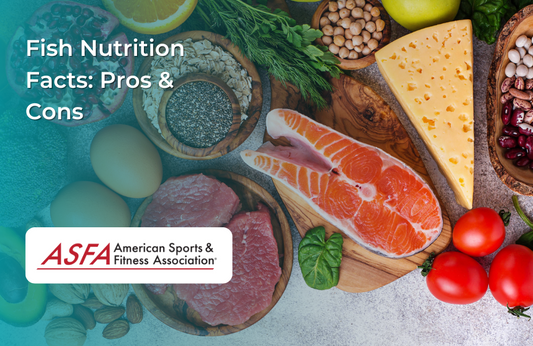Fish is a nutrient-dense protein source packed with omega-3 fatty acids, vitamins, and minerals. It is widely recognized for its health benefits, particularly for heart and brain function. However, some types of fish contain mercury and contaminants, making it important to choose wisely. Understanding the pros and cons of fish consumption helps in making informed dietary choices.
Fish Nutrition Facts: Pros and Cons of Eating Fish
High-Quality Protein Source
Fish is an excellent source of complete protein, providing all essential amino acids needed for muscle repair, growth, and overall body function.
Rich in Omega-3 Fatty Acids
Many fish, especially fatty fish like salmon, mackerel, and sardines, are rich in omega-3s (EPA and DHA), a type of polyunsaturated fatty acids, which:
-
Support heart health by reducing bad cholesterol and lowering blood pressure.
-
Improve brain function and cognitive health by supporting memory and reducing the risk of neurodegenerative diseases.
-
Reduce inflammation, helping with joint pain and overall wellness.
Supports Heart Health
Eating fish regularly is linked to a lower risk of heart disease due to its beneficial fats, protein, and micronutrients like potassium and magnesium, which regulate blood pressure.
Consuming farmed salmon, in particular, has been shown to significantly reduce heart disease risk, although it is important to be aware of potential contaminants like PCBs and mercury.
Supports Brain Function and Development
Eating fish, particularly oily fish, has been shown to support brain function and development. The omega-3 fatty acids found in fish, especially EPA and DHA, play a crucial role in brain health. Research has found that fish consumption is associated with improved cognitive function, memory, and focus. In fact, studies have shown that eating fish regularly can even help reduce the risk of age-related cognitive decline and dementia.
Fish oil intake has also been linked to improved brain development in children. Pregnant women who consume fish oil supplements or eat fish rich in omega-3s have been found to have children with better cognitive and motor skills. Additionally, fish oil has been shown to support the development of the brain and nervous system in infants and young children.
In terms of specific fish species, fatty fish like salmon, sardines, and mackerel are particularly beneficial for brain health due to their high levels of omega-3s. Wild fish, such as wild-caught salmon, tend to have higher levels of omega-3s than farmed fish, making them a better choice for brain health.
Overall, incorporating fish into a healthy diet can have numerous benefits for brain function and development. With its rich stores of omega-3 fatty acids, fish is an excellent food for supporting cognitive health and reducing the risk of age-related cognitive decline.
Provides Essential Vitamins and Minerals
Fish contains a variety of important nutrients, including:
-
Vitamin D – Supports bone health and immune function.
-
B Vitamins (B12, B6, Niacin, Riboflavin) – Aid metabolism and brain function.
-
Iodine – Essential for thyroid health.
-
Selenium – Acts as an antioxidant, protecting cells from damage.
Regular fish intake is crucial for obtaining these essential vitamins and minerals, contributing to overall health and reducing the risk of various medical conditions.
Supports Eye Health
Omega-3s and antioxidants found in fish, particularly in cold-water species, may reduce the risk of age-related vision decline and dry eyes.
Low in Saturated Fat Compared to Red Meat
Most fish are low in saturated fat, making them a heart-friendly protein option compared to red meats, which contain higher amounts of unhealthy fats.
Versatile and Easy to Prepare
Fish can be prepared in various ways, such as grilling, baking, steaming, or pan-searing, making it easy to incorporate into different diets.
Cons of Eating Fish
Potential Mercury and Heavy Metal Contamination
Certain fish, especially larger predatory fish like swordfish, king mackerel, and shark, contain higher mercury levels, which may pose risks for:
-
Pregnant women and young children.
-
Individuals consuming fish in large amounts regularly.
Environmental and Sustainability Concerns
Overfishing and unsustainable fishing practices have led to declining fish populations and environmental damage. Choosing sustainably sourced fish helps support responsible fishing.
Possible Exposure to Pollutants
Some fish may contain PCBs (polychlorinated biphenyls) and dioxins, which are environmental pollutants. Farmed fish, particularly from low-regulation sources, may have higher contamination risks. There is also concern that these contaminants could increase the risk of neurodegenerative diseases like Alzheimer's disease.
Risk of Allergies or Sensitivities
Fish is a common allergen, and some individuals may experience reactions ranging from mild discomfort to severe anaphylaxis.
Cooking Methods Can Affect Health Benefits
Deep-frying fish or preparing it with unhealthy fats can reduce its health benefits and add unnecessary calories. Opting for grilled, baked, or steamed fish retains more nutrients while keeping it heart-healthy.
Conclusion
Fish is a nutrient-rich, heart-healthy food that provides high-quality protein, omega-3 fatty acids, and essential vitamins and minerals. However, choosing low-mercury, sustainably sourced fish and preparing it healthily is key to maximizing benefits while minimizing risks. Including fish a few times per week as part of a balanced diet supports overall health, brain function, and heart wellness.
FAQs
Is fish healthier than red meat?
Yes, fish is generally lower in saturated fat and contains heart-healthy omega-3s, making it a better choice for cardiovascular health.
How often should I eat fish?
Most health experts recommend eating 2-3 servings of fish per week, especially fatty fish for omega-3 benefits.
What are the best low-mercury fish?
Salmon, sardines, trout, cod, tilapia, and haddock are low in mercury and high in nutrients.
Can fish help with weight loss?
Yes, fish is high in protein and low in unhealthy fats, making it a good option for weight management.
What’s the healthiest way to cook fish?
Grilling, baking, steaming, or pan-searing with healthy oils (such as olive oil) helps retain nutrients while avoiding excess unhealthy fats.





